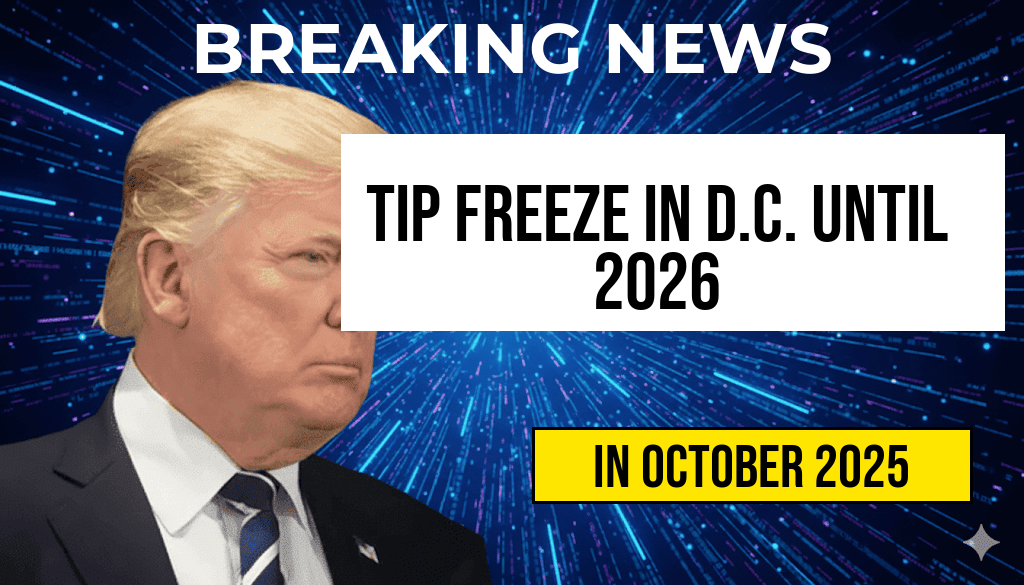As the District of Columbia grapples with a significant policy decision, a recent mandate has frozen tip wages at $10 per hour until July 2026. This decision has left thousands of service industry workers with stagnant earnings, as they will not see a base pay raise this year. The legislation, which has sparked considerable debate, is intended to provide stability during uncertain economic times but has raised concerns among workers who rely heavily on tips to supplement their income. Many employees in the hospitality sector argue that the freeze undermines their financial security and long-term earning potential, especially in a city known for its vibrant service industry.
Understanding the Wage Freeze
The wage freeze, enacted by the D.C. Council, stems from a broader initiative aimed at stabilizing the local economy amidst ongoing recovery efforts post-pandemic. The decision means that the minimum wage for tipped employees, which is currently set at $10, will remain unchanged for the next three years. This policy has been met with mixed reactions from various stakeholders.
Impact on Service Workers
For many workers in the restaurant and hospitality sectors, tips are a significant component of their overall earnings. The following points outline the major concerns regarding the tip wage freeze:
- Stagnant Income: With rising living costs, employees argue that the lack of a wage increase will exacerbate financial difficulties.
- Reliance on Tips: Many workers depend on tips to make up the difference between the base wage and a living wage.
- Job Retention: Some employees express worries about job security, fearing that stagnant wages may lead to higher turnover rates.
Reactions from Stakeholders
The decision has prompted responses from various groups, including workers, employers, and advocacy organizations.
Workers Demand Change
Service workers have voiced their dissatisfaction, calling for a reconsideration of the policy. A local group, the National Restaurant Association, has stated that while they understand the need for economic stability, they believe that the wage freeze disproportionately affects those who earn their livelihoods through tipping. Many employees have taken to social media to share their stories, emphasizing the struggles of making ends meet with a fixed wage.
Employer Perspectives
On the other side, restaurant owners and managers have expressed mixed feelings about the freeze. Some argue that a stable wage structure could help retain employees during tough economic times. Others believe that a lack of wage growth could deter new talent from entering the industry, especially as competition for skilled workers intensifies.
Legislative Background
The D.C. Council’s decision to implement the tip freeze is part of a larger legislative framework that seeks to address wage disparities and ensure fair compensation for all workers. The council has faced pressure from both sides of the debate, with advocates for workers pushing for higher wages and those concerned about the economic impact of wage increases warning against potential job losses.
Future Considerations
As the tip freeze extends until July 2026, several questions loom over the future of the service industry in Washington, D.C.:
- Will there be a review of the policy? The council has indicated that it will monitor the economic impacts of the freeze, which may open the door for future discussions on wage adjustments.
- How will inflation affect the cost of living? With inflation rates fluctuating, many workers are concerned about their ability to afford basic necessities.
- What are the implications for labor rights? Advocacy groups are likely to continue pushing for reforms that ensure fair wages and protections for workers.
| Year | Status |
|---|---|
| 2023 | Wage frozen at $10 |
| 2024 | Wage frozen at $10 |
| 2025 | Wage frozen at $10 |
| 2026 | Review and potential adjustment |
As the debate over tipped wages continues, the future of service workers in Washington, D.C. remains uncertain. With a focus on economic stability, the council’s decision reflects a complex balance of interests that will require careful navigation in the coming years. For more information on labor rights and wages in the D.C. area, visit the D.C. Labor Council.
Frequently Asked Questions
What is the current status of the tip wage in Washington D.C.?
The tip wage in Washington D.C. is currently frozen until July 2026, meaning that many workers will be stuck at a minimum wage of $10 per hour.
Why is there no base raise for workers this year?
The tip freeze has resulted in no base raise for workers in the hospitality industry this year, as the law prevents any increase in the tip wage until the freeze is lifted.
How does the tip freeze affect workers reliant on tips?
The tip freeze significantly impacts workers who rely on tips for their income, leaving many unable to earn more than $10 per hour despite rising living costs.
When will the tip wage be reviewed again?
The tip wage will be reviewed again after the freeze ends in July 2026, at which point there may be discussions about potential increases.
What actions are being taken to address the tip wage situation?
Various advocacy groups are calling for changes to the tip wage policy, urging lawmakers to reconsider the freeze and provide better protections and pay for workers in the service industry.






